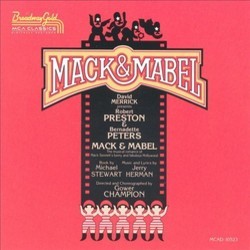Mack & Mabel
Original Broadway Cast
¡Subscríbete!
¡Manténgase informado y obtener mejor acceso a la información de los coleccionistas!
¡Manténgase informado y obtener mejor acceso a la información de los coleccionistas!
| # | Pista | Artista/Compositor | Duración |
|---|---|---|---|
| 1. | Overture | 4:37 | |
| 2. | Movies Were Movies | Robert Preston | 2:42 |
| 3. | Look What Happened to Mabel | Bernadette Peters | 3:35 |
| 4. | Big Time | Lisa Kirk | 2:54 |
| 5. | I Won't Send Roses | Robert Preston | 3:06 |
| 6. | I Won't Send Roses (Reprise) | Bernadette Peters | 2:06 |
| 7. | I Wanna Make the World Laugh | Robert Preston | 2:05 |
| 8. | Wherever He Ain't | Bernadette Peters | 3:01 |
| 9. | Hundreds of Girls | Robert Preston | 3:30 |
| 10. | When Mabel Comes in the Room | Stanley Simmonds | 5:29 |
| 11. | My Heart Leaps Up | Robert Preston | 2:17 |
| 12. | Time Heals Everything | Bernadette Peters | 3:46 |
| 13. | Tap Your Troubles Away | Lisa Kirk | 2:59 |
| 14. | I Promise You a Happy Ending | Robert Preston | 2:50 |
| 44:57 |
The Broadway musical Mack & Mabel, having opened on October 6, 1974, closed on November 30 after 65 performances, a flop. Three days later, on December 3, 1974, the original Broadway cast album was released. The recording is destined to become one of those prized by musical theater fans who will ponder how a show with such a good score could have failed. Certainly, the portents were good. Songwriter Jerry Herman, responsible for the hits Hello, Dolly! and Mame, re-teamed with the librettist of Hello, Dolly!, Michael Stewart, and that show's director/choreographer Gower Champion, and they cast two Broadway stars, Robert Preston (The Music Man) and Bernadette Peters (Dames at Sea) in the title roles. The 'Mack' and 'Mabel' of the title were Mack Sennett, the director of silent film comedies featuring the Keystone Kops in the 1910s and '20s, and Mabel Normand, whom he made into a star. The two were a romantic couple, so the scenario offered a combination of the hi-jinks of the silent screen and a love story. It was, however, a tragic love story: Sennett and Normand never married; they eventually split up professionally and personally; and Normand later died young after a scandal-ridden post-Sennett career. Thus, Mack & Mabel could only be a 'musical comedy' in a formalistic sense. But that may have been what attracted Herman. He had succeeded with his frothy twin hits in the mid-'60s, then stumbled in 1969 with Dear World, a seriously intended musical adaptation of the play The Madwoman of Chaillot, and had been silent for nearly five years. In that time, the musical theater had taken a distinctly dark and serious turn in the hands of rivals like Stephen Sondheim and the team of John Kander and Fred Ebb. Sondheim, for example, won the Tony Award for best composer three years in a row for his ambitious, experimental shows Company, Follies, and A Little Night Music. These were not Jerry Herman's type of Broadway musicals, and in the character of Mack Sennett he seems to have found a vehicle for expressing his opinion. Herman and Stewart's Sennett is a man who finds the injection of artistic aspirations into entertainment pretentious. In his first song, 'Movies Were Movies,' he looks back on his career declaring, 'No one pretended that what we were doing was art/We had some guts and some luck/But we were just making a buck.' He expands on this attitude in 'I Wanna Make the World Laugh.' And in the show's next-to-last song, the second female lead, Lottie (Lisa Kirk), reiterates the point in the Harry Warren-like 'Tap Your Troubles Away,' which prescribes tap dancing for all that ails the world. Ironically, this view is presented in a musical that itself eschews the traditional form of musical comedy and instead leans toward the darkness so prevalent in Sondheim and Kander and Ebb. Sennett promises a happy ending, but he can't deliver one, except as fantasy. It's often hard to say what makes a show a failure, but this one seems to suffer from a mixed message. Nevertheless, along the way there are some memorable songs, memorably performed. At the head of the list is 'I Won't Send Roses,' in which Sennett attempts to warn Normand off romantically. It might be the theme song for absent-minded husbands the world over, but it is remarkably acute. Equally effective is 'Time Heals Everything,' Normand's final number, as poignant and heartbreaking a torch song as Sondheim's 'Losing My Mind' from Follies or Richard Rodgers and Lorenz Hart's 'It Never Entered My Mind' from Higher and Higher, which is to say, as good as a torch song can be. The rest of the score is sturdy, identifiable Herman, tuneful and craftsman-like without being formally challenging. (For example, 'When Mabel Comes in the Room' is very much a descendant of the songs 'Hello, Dolly!' and 'Mame.') Mack & Mabel may be a flop on-stage, but in the record racks it is as much of a success as any of Herman's scores.

